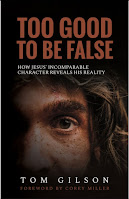We can approach the Bible differently, though. Having a broad familiarity with the Bible is good. So is having a depth of knowledge. It's good to get into the Bible; it's better to get the Bible into you. So if you've read through the Bible more than a couple of times, perhaps it'd be a good year to slow down. Way down.
Bible-in-a-year plans abound, but basically if you average three chapters a day you'll get through the Bible in about a year. What if you, instead, read one chapter three times? Don't just read the chapter but ask it questions and spend time reflecting on what you learn. Yes, that means it would take you three years to read through the Bible. But you'd probably know it better.
Other approaches: John MacArthur talks about reading a book every day for thirty days (breaking up longer books into sections that are treated the same way). With this approach, it'll take several years to read through the Bible.
Maybe thirty times through is more than you've got the patience for; how about five times? Reading a short book, for example Ephesians, through in one sitting every day for a week will help you see the whole message of the book and how the parts connect.
Don't be afraid to read commentaries, either. Going slowly through a book with a commentary in hand, written by someone who's spent years studying that book, can be very illuminating.
I think my approach in the coming year — the next few, actually — will be to read a book through a couple of times and then go a chapter at a time (maybe less). I'll read the passage once to get the big picture then go through it again asking questions of the text and meditating and praying on the answers.
What questions? These have been endlessly useful:
- What is the main message of this passage?
- What does this tell me about God?
- What does this tell me about human nature?
- Is there anything here I need to know, stop doing, change, or start doing?
But whatever approach you take, I hope you'll make a plan to be in the Bible regularly in the coming year. The world is constantly trying to conform us to itself. Either we will be transformed by the renewing of our minds, or we will be conformed to the world. There are no other options.
Other questions:
The 5 W’s & H in Bible Study
7 Arrows of Bible Reading
Related:
The New Testament Out of Order
7 Tips for Reading the Bible in a Year
Image via Pixabay














